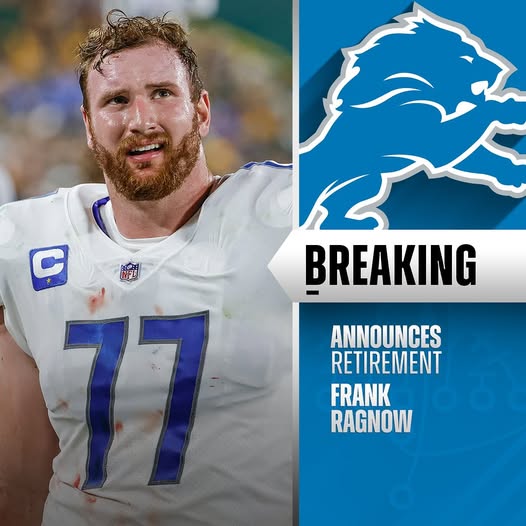In a move that sent ripples of surprise and heartfelt appreciation across the National Football League, particularly within the passionate fan base of the Detroit Lions, Pro Bowl center Frank Ragnow officially announced his retirement from professional football after a distinguished seven-season career. The decision, made public on a quiet Monday, brings to a close the tenure of one of the league’s most dominant and respected offensive linemen, a player whose relentless tenacity, unparalleled skill, and unwavering leadership profoundly impacted the Lions franchise and earned him widespread admiration from peers and coaches alike. While the news undoubtedly leaves a void on the Lions’ offensive line, it also prompts a reflection on a career defined by excellence, resilience, and an unyielding commitment to his team.
Frank Ragnow’s journey to NFL stardom began at the University of Arkansas, where he quickly established himself as a formidable presence on the offensive line. His collegiate career was marked by consistent performance, demonstrating the raw power, technical precision, and football intelligence that would later define his professional game. He was a highly touted prospect coming out of college, recognized for his rare combination of strength, agility, and a cerebral approach to the center position. The Detroit Lions, recognizing his immense potential, selected him in the first round of the 2018 NFL Draft, a move that immediately signaled their intent to rebuild their offensive line with foundational talent.
From the moment he stepped onto an NFL field, Ragnow made his presence felt. He quickly transitioned from a promising rookie to a cornerstone of the Lions’ offensive line, a unit that, under his leadership, transformed from a weakness into a formidable strength. Playing center, a position that demands not only physical prowess but also exceptional communication and intelligence, Ragnow excelled in every facet. He was responsible for making pre-snap calls, identifying defensive fronts, and coordinating blocking assignments – a complex mental game that he mastered with remarkable ease. His ability to consistently execute these critical tasks, often under immense pressure, set him apart.
Over his seven seasons, Ragnow earned a reputation as one of the league’s premier centers, a consistent Pro Bowl selection, and a player who was universally respected for his toughness and dedication. He was a dominant force in both run blocking and pass protection, capable of neutralizing elite defensive linemen and opening gaping holes for his running backs. His technique was impeccable, his hand placement precise, and his leverage unmatched. Beyond his individual brilliance, he elevated the play of the entire offensive line, fostering a cohesive unit that prided itself on its physicality and relentless effort.
However, Ragnow’s career was also marked by a relentless battle against injuries. Despite his immense talent and unwavering commitment, he frequently played through pain, demonstrating a level of grit and determination that endeared him to teammates and fans. Foot, toe, and back issues were recurring challenges, often forcing him to miss games or play at less than 100%. Yet, when he was on the field, his performance rarely wavered, a testament to his mental fortitude and his sheer will to compete. These persistent physical tolls undoubtedly played a significant role in his decision to retire, prioritizing his long-term health and well-being after years of sacrificing his body for the game he loved.
The impact of Frank Ragnow’s retirement on the Detroit Lions cannot be overstated. He was not just a player; he was a leader, a mentor, and a foundational piece of a team that has experienced a remarkable resurgence in recent seasons. His presence on the offensive line provided a sense of stability and reliability that allowed the Lions’ offense to flourish. Quarterbacks trusted him implicitly to protect their blind side, and running backs ran with confidence knowing that Ragnow would create lanes for them. His leadership extended beyond the field, as he was a respected voice in the locker room, embodying the team’s blue-collar ethos and its commitment to relentless effort.
For the Lions, the immediate challenge will be to find a successor who can even remotely replicate Ragnow’s unique combination of skill, intelligence, and leadership. The center position is crucial for offensive line cohesion, and replacing a player of his caliber will be a monumental task. The team will likely explore options through the NFL Draft, free agency, and internal development, but the void left by Ragnow’s departure will be deeply felt, both physically and emotionally.
Ragnow’s retirement also prompts a broader reflection on the physical demands of professional football, particularly for offensive linemen. These athletes engage in a brutal, violent ballet on every snap, absorbing immense forces and subjecting their bodies to constant trauma. The long-term health consequences, even for those who appear outwardly robust, are significant. Ragnow’s decision highlights the difficult choices athletes face when balancing their passion for the game with the imperative to protect their long-term well-being. It underscores the reality that even the most dedicated and physically gifted players eventually reach a point where the cumulative toll becomes too great.
The announcement of his retirement was met with an outpouring of tributes from across the NFL. Teammates, both current and former, shared heartfelt messages on social media, praising his toughness, his professionalism, and his genuine character. Coaches lauded his intelligence and his unwavering commitment to excellence. Opposing players, who had battled against him in the trenches, acknowledged his dominance and his competitive spirit. These widespread tributes are a testament to the respect and admiration Ragnow had earned throughout his career, not just for his on-field performance but for the kind of person he was.
For the Detroit Lions fan base, the news was bittersweet. While saddened by the departure of a beloved player, there was also an overwhelming sense of gratitude for his contributions and an understanding of his decision. Ragnow had become an icon in Detroit, a symbol of the team’s resilience and its journey from perennial struggles to legitimate contention. His unwavering commitment to the franchise, even during challenging times, had forged a deep bond with the fans, who recognized his genuine passion for the city and its team. His retirement marks the end of an era for the Lions’ offensive line, but his legacy as one of the franchise’s all-time greats is firmly secured.
Looking ahead, Frank Ragnow’s post-NFL life will undoubtedly be different from the relentless grind of professional football, but his future promises to be equally impactful. Given his intelligence, his leadership qualities, and his deep understanding of the game, he could pursue opportunities in coaching, broadcasting, or sports administration. However, his immediate focus will likely be on his health, his family, and enjoying a well-deserved break from the physical and mental demands of the NFL. His retirement serves as a powerful reminder that there is life beyond football, and that the well-being of athletes extends far beyond their playing days.
The decision to retire from professional sports is never an easy one, particularly for a player still at the peak of his powers. It involves a complex calculus of physical health, mental fortitude, family considerations, and future aspirations. For Frank Ragnow, after seven seasons of giving his all to the Detroit Lions and the game of football, the time had come to prioritize his long-term health and embark on a new chapter. His announcement, while marking the end of an illustrious playing career, also celebrates a life well-lived on the gridiron, a career defined by unwavering dedication, exceptional talent, and an enduring legacy of excellence. The Detroit Lions and their fans will forever cherish the memories of Frank Ragnow, the dominant center who helped lay the foundation for their resurgence and left an indelible mark on the franchise. His retirement is a loss for the NFL, but a well-earned transition for a true warrior of the game.

